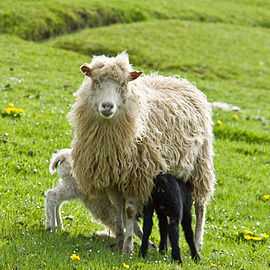Faroes (sheep)

The Faroes is a breed of domestic sheep native to the Faroe Islands. One of the Northern European short-tailed sheep, it is a small, very hardy breed. Faroes ewes weigh around 45 pounds (20 kg) at maturity, and rams are 45–90 pounds (20–40 kg). Rams are horned and ewes are usually polled, and the breed occurs naturally in many different colors. Faroes tend to have very little flocking instinct, and will range freely in small groups in pastureland. They are most closely related to the Old Norwegian and Icelandic breeds.[1]
Cultural impact

First introduced in the 9th century,[2] Faroes sheep have long been an integral part of the island traditions. The name Faeroe itself is thought to mean "sheep islands", and the animal is depicted on the Faroe Islands' historic coat of arms. Lamb and mutton dishes made from Faroes sheep, such as skerpikjøt, are a large part of traditional island cuisine. The breed is primarily kept for meat production, but wool is used for traditional knitwear like the Faroese shawl.
See also
- Faroe Islands domestic animals
- List of sheep breeds
- Lítla Dímun (sheep)
References
- ↑ "Faeroes". ansi.okstate.edu. Oklahoma State University Dept. of Animal Science.
- ↑ Thomson, Amanda M.; Simpson, Ian A.; Brown, Jennifer L. (November 18, 2005). "Sustainable Rangeland Grazing in Norse Faroe". Human Ecology 33 (5): 737–761. doi:10.1007/s10745-005-7596-x.
| Wikimedia Commons has media related to Faeroes sheep. |